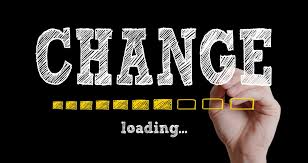Conversations with Coach

Have you ever wondered why change is difficult? Tony Robbins says, "Change happens when the pain of change becomes greater than the pain to remain the same." We are creatures of comfort and of habit. Most of us don't do well when our regular routine gets interrupted, or the way we do our job is changed. For instance, take a look on social media and you will see angry posts when the person's App gets a new update. So, what makes us so resistant to change and how can we change it? If you saw my Mindset Monday post earlier this week, it included five reasons people resist change. I will review each of these reasons and provide you with a way to get beyond your resistance. 5 Reasons People Resist Change and How to Move Beyond It 1) People fear being different especially if what they are being asked to do has never been done. - If you are the leader initiating the change, you move beyond this resistance by effectively communicating and demonstrating to minimize hurt feelings and frustration. You must balance telling and showing. 2) People feel overwhelmed and stressed. - If you are a leader or individual who has experienced a lot of change in a short period of time, fatigue can set in. When people are tired, they tend to irritable and angry. Their resistance to change is front and center. You move beyond this resistance by a) being understanding to their complaints and b) attentive to their needs through the process. Keep the focus on the reason for the change and make the environment more appealing to accept the change. 3) People fear a departure from the status quo. - Even though the reason for the change is to move away from the idea "we've always done it this way", resistance is met from those who were a part of the old way or those who have a different idea, may be defensive of both. The way to move beyond this resistance in either case is to acknowledge the parts from the past that are good and by making it clear that the suggestions that are being made are necessary. 4) People lack trust in the one making the change. - When people have trust in their leader, they become skeptical in a new leader. It is important that the new leader embraces the responsibility of cultivating a relationship that can be trusted. If trust is not built, mistrust is the default. Leaders can cultivate trust by including people in the change and by creating an environment where the people feel the change can be a benefit for all involved. 5) People know change brings a new set of possibilities and problems. - Naturally we know change brings a new set of possibilities and problems. Most of us will reject the possibilities if it also means avoiding problems. Leaders can overcome this resistance by creating certainty in the process. The next time you are faced with change, ask yourself these five questions and then choose to overcome your objections. Remember, "Change happens when the pain of change becomes greater than the pain to remain the same." Are you tired yet? #blog #blogpost #blogger #mindsetcoach #conifidence #confidencecoach #mindsetshift Christina Callaway is a Certified Mindset and Confidence Coach helping individuals to meet their goals one mind shift habit at a time. If you are ready to reach your goals and overcome your resistance to change, schedule your FREE Clarity Call today!

As a former competitive athlete, I am grateful my parents had a healthy balance of knowing when to push me to be my best and when to turn the reigns over to me and allow my own intrinsic motivation to be the fuel that drove my desire and passion. I remember some of our conversations during the car ride home as they asked me "How was practice?" The conversations were brief and positive. Most of their questions were simple, such as, "Are you still enjoying gymnastics?" Our conversations after a competition weren’t much different. Those questions sounded like, "how do you think you did today?" and "what do you want to eat?" Let's face it, my gymnastics meet were a family affair and by the time the meets ended, everyone was exhausted from having endured four hours of sitting on hard bleachers. The last thing anyone wanted to do was listen to a play-by-play of what they had just watched. On the off chance I had not done particularly well and I was upset, my father would help me by asking me if I had done my best. If I assured him that I had, he would respond MY best is all I could do. I would then get a life lesson on how there would always be someone better than me. MY responsibility in practice was to prepare to be MY best and then go out and do MY best every time with the understanding that sometimes MY best would not be good enough; however, that did not mean I was a failure or that I should stop doing or being MY best. Unfortunately, conversations like the one I shared with my father are too often missing in youth sports today. As a coach for over three decades, I have seen and heard colleagues say athletes are leaving sports sooner than they would like for them to because of the car ride home. So, what is it about the car ride home that “drives” so many athletes from the sports they love? As a Certified Mindset and Confidence Coach, I can share with you some common mistakes parents are making during the car ride home. If you identify with any of these, I can assure you there is still time to "reverse" course and change the dialogue between you and your athlete. Well-meaning parents are failing to recognize the that time after a game (or practice) is critical for their athlete. What makes the car ride home such a critical time for the athlete? Kids are physically and emotionally exhausted. This is not the time for parents to choose to make it a "teachable moment” by commenting on the coach’s decisions or their child’s performance (or lack thereof).

What comes to mind when you think about this question? Five years? 10 years? Most of us would call ourselves creatures of habit. We operate on automatic pilot for 95% of our daily routine. From the time we wake up in the morning until we go to bed, we probably give very little thought to the mundane tasks that we do, and it’s not until we are asked to do something outside of these tasks that we actually stop to think about our actions. So, why don’t we change our habits more often? Or the other question, why is it important to change our habits? Studies have shown when we break the monotony of our “time to make the donuts” routine, we stimulate the myelin (the protective membrane surrounding the nerve endings in our brain) in our brain which helps our memory. We become resistant to change because we enjoy being in control and we grow comfortable. The downfall to both of these states of being is we then limit our opportunities to success, growth, meeting others, and an overall decline in our health. 5 Benefits of Doing Something New: 1) Improve our brain function - 'mental sweat' helps our brain build new cells and strengthen connection between the cells. To challenge ourselves, we should identify at least one thing a month that we can do for the first time. When we learn something new we are exercising our brain, which can help improve cognitive functions such as concentration, attention to detail, memory recall and problem solving, and also reduce the chance of developing dementia. 2) Meet new people - taking up a new hobby or sport or going to a class to learn something new is a great way to meet new people. Not only will you learn something, but you’ll also spend time with other people who have a similar interest and potentially make new friends. 3) Become involved in our community - Depending on what you learn, you may develop a sense of feeling more connected to your community. Coming together with other locals for a common purpose will help give you a sense of community and belonging and may benefit the place you live in. 4) Feel good about your new skill - There is nothing more satisfying than a sense of achievement. Setting yourself a goal to learn something new, then achieving it, is super rewarding and gives you a sense of accomplishment. 5) Have fun - While learning something new may be challenging, it can also be heaps of fun. Most people won’t great at something they haven’t tried before when they first start, but it can be really enjoyable to be pushed out of your comfort zone when you try something new. (https://www.healthnavigator.org.nz/healthy-living/l/learning-new-things-the-benefits/). Examples of Trying Something New Brush teeth with the opposite hand starting on the opposite side of your mouth Sit in a different chair when you come home from work. Take a different route home for work Listen to a podcast Doodle or try an adult size coloring book Volunteer for an organization Doing any one of these small tasks will strengthen neural connections in the brain and even grow new ones. It’s similar to how physical exercise improves our body’s function and grows new muscle. Challenge yourself for the next two weeks to do something new for first time. You just might surprise yourself. #blog #blogpost #blogger #mindsetcoach #conifidence



